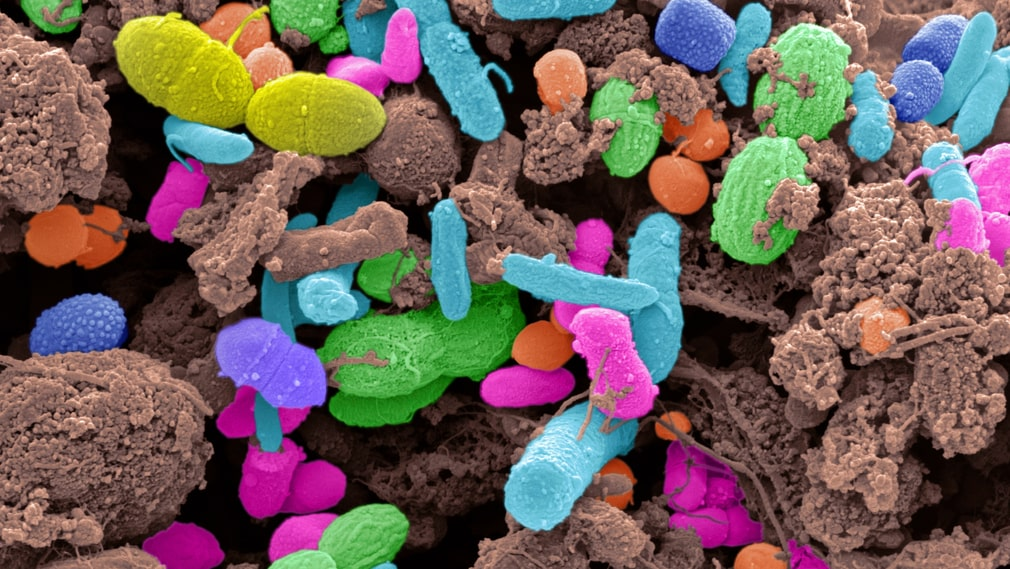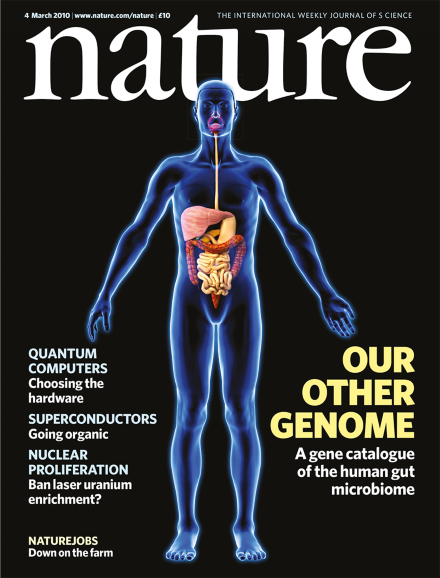100 trillion (a “1” followed by fourteen “0” s) - if you think this is a large number that only belongs to astronomy or space science, think again. This is the estimated number of microbial cells in our body, and most of those microbes are found in the intestine, or gut.
The intestinal tract is a part of the digestive organs and the largest immune organ in the human body. 70% of the entire human immune system is located here, as well as 80% of plasma cells responsible for antibody production. A large number of microorganisms such as bacteria, archaea, fungi, and viruses live in the intestinal tract, creating a complex and dynamic ecological environment.
 Fecal bacteria (Photograph: Science Photo Library)
Fecal bacteria (Photograph: Science Photo Library)
Weighing approximately two kilograms, these microorganisms are called the gut microbiota. A healthy intestinal tract contains three types of gut microbiota - beneficial, harmful, and neutral - and together they maintain a dynamic balance. However, when the composition of gut microbiota is out of balance, harmful microorganisms will multiply and damage the healthy environment of the intestinal tract, resulting in discomforts such as gas, bloating, constipation, diarrhea, and heartburn.
Human gut microbiota has become the subject of extensive research in recent years and our knowledge of these tiny residents and their potential power is rapidly growing. More and more research on the relationship between gut microbiota and human health/disease can be found in international scientific journals including Nature, Science, and Cell.
Perhaps one of the most iconic research projects is the study led by Professor Jeffrey Gordon’s team from Washington University in St Louis, USA, which demonstrated gut microbiota’s influence on weight in mice.
One of their studies showed that the guts of obese individuals contain altered microbiomes that, in some contexts, can contribute to obesity. Researchers harvested microbes from fat and lean mice, and then fed them to germ-free ones. The result was astonishing - those that got microbes from lean donors put on 27% more fat, while those with obese donors gained 47% more fat. The research effectively transferred obesity from one animal to another, simply by moving their microbes across.
It also works the other way around. A study found that Akkermansia muciniphila, one of the more common species of gut bacteria, is over 3,000 times more common in lean mice than in those genetically predisposed to obesity. Obese mice lose weight and show fewer signs of type 2 diabetes if they eat it.
Mouse biology and their microbes share high similarities with human beings. Professor Gordon was a strong contender for the 2015 Nobel Prize, for his role in founding the field of human gut microbiome research and revolutionizing the understanding of gut microbes and their roles in human health and disease. In 2021, he was awarded the Balzan Prize for his groundbreaking research.
In addition to obesity, more than 50 kinds of health problems have been confirmed to be associated with the imbalance of gut microbiota. In recent years, more and more people realize that the health of our intestinal tract is highly related to the overall health of our body.
The emergence of high-throughput sequencing, large-scale parallel computing, and bioinformatics analysis tools has completely changed the way scientists explore the complex microbial communities in our body.
As a world-leading institution of life sciences, BGI-Research has been working tirelessly in the field of gut microbiome research and has published more than 70 research papers related to gut microbiota.
As a part of the international MetaHIT (Metagenomics of the Human Intestinal Tract) project, a human gut microbial gene catalog was established by an international collaboration led by BGI researchers, and published as a cover article in the journal Nature in March 2010, marking the start of a new era of exploring the composition and function of human intestinal microbes from the genetic level using high-throughput sequencing. In the same year, Science called the concept of the microbiome one of the top 10 scientific insights that changed the face of science during the first decade of the 21st century.
 Volume 464 Issue 7285, 4 March 2010 (Credit: Roger Harris /Science Photo Library.)
Volume 464 Issue 7285, 4 March 2010 (Credit: Roger Harris /Science Photo Library.)
In 2011, a study on gut microbiota participated by BGI-Research found that human internal microbial communities fell roughly into three "intestinal types" (enterotypes), which the researchers dubbed Bacteroides, Prevotella, and Ruminococcus after the dominant microbe in each. This was the first time that such a concept was proposed, and it was selected as one of the runners-up in the 2011 “Breakthrough of the Year” by Science.
In 2019, BGI-Research released a gene set of more than 1,500 reference genomes from cultivated human gut bacteria, providing an important basis for accurately deciphering the relationship between gut microbiota and diseases.
In addition to the above research, BGI has collaborated with many other institutions to explore the relationship between gut microbiota and various health problems.
With a greater understanding of how gut microorganisms shape the health of our body, people begin to explore how to use the “good” microorganisms - probiotics - to improve our overall health.
The Food and Agriculture Organization of the United Nations and the World Health Organization define probiotics as “live microorganisms which when administered in adequate amounts confer a health benefit on the host”.
Probiotics are not a single bacterium, but a huge family. Probiotics are generally named by genus, species, and strain. When beneficial bacteria strains are selected, cultivated, and made into supplements or added to food, they can survive in stomach acid and bile, and finally colonize in our intestines to perform a beneficial effect on the human body.
At present, the most commonly used probiotic strains include Bifidobacterium, Lactobacilli, S. boulardii, B. coagulans, etc. In October 2022, BGI-Research and BGI-Nutri received patent approval for Lactobacillus rhamnosus OF44, which prevents and/or treats diseases caused by the reproductive tract microbiota disorder and/or bone loss.
While mankind’s understanding of gut microbiota has advanced significantly there is still a lot to be discovered and omics technologies are enabling new and innovative approaches to the study of microbial metabolism.
Our bodies are truly phenomenal organisms, so next time you are enjoying your favorite food, spare a thought for the trillions of microbial cells in your gut that are helping to keep you healthy.



